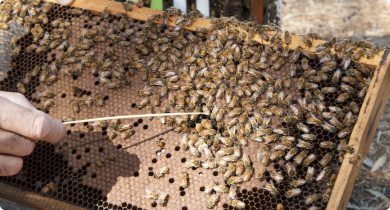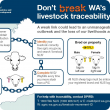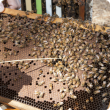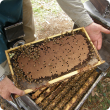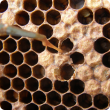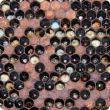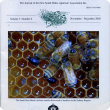Bees
The Department of Primary Industries and Regional Development (DPIRD) supports the thriving Western Australian honey bee industry.
Register as a beekeeper with DPIRD
All persons keeping bees in WA are legally required to register with DPIRD. To register as a beekeeper, regardless of whether you have one beehive or 1000, use the Beekeeper registration application form. Upon registration, beekeepers are issued a certificate and provided a unique hive brand that must be legally applied to all supers (including brood boxes). For further information on registration, visit the Registering as an owner of stock or as a beekeeper webpage or contact the Brands Office (Bunbury) by phone 1300 926 547 or email Brands.Bunbury@dpird.wa.gov.au.
For further information on beekeeping in WA, download the Becoming a beekeeper in WA factsheet. Detailed information can be found on the department’s Becoming a beekeeper in Western Australia webpage.
In addition to registering with the department, all beekeepers in WA are legally required to:
- apply their registered hive brand to all supers
- report all detections of declared pests
- make and retain records of apiary sites and introductions, movements, and sales of bees for seven years
- ensure apiaries have clear and legible signage with contact information, where bees are kept on land that does not belong to the beekeeper; and
- make themselves aware of all their obligations under the Biosecurity and Agricultural Management Act 2007 and associated regulations.
Report honey bee pests and surveillance
Western Australia’s honey bees are free of many significant pests and diseases found in eastern Australia and overseas. This high value health status results from - and depends on - tight border biosecurity and a strong commitment to surveillance and disease reporting by the department and the beekeeping industry.
All detections of declared pests that have a restricted distribution in WA (such as Small hive beetle) and exotic pests and diseases (such as Varroa mites and European foulbrood) must be immediately reported by calling the Exotic Plant Pest hotline 1800 084 881.
To report established apiary pests or apiary surveillance, such as alcohol washing results, visit our webpage on Reporting bee pests and surveillance.
For bee biosecurity enquiries, email the department’s apiary unit pbhoney@dpird.wa.gov.au.
To help beekeepers identify pests and diseases in their apiaries, the department has developed a field guide to Honey Bee Biosecurity in WA. Further information on specific honey bee pests and diseases can be found on the BeeAware website. All WA beekeepers are encouraged to be compliant with the Australian Honey Bee Industry Biosecurity Code of Practice and to complete the free Biosecurity for Beekeepers course through Plant Health Australia’s Biosecurity Online Training (BOLT) platform.
Further information about beekeeping in WA can be found in the articles listed below:
Import Requirements
To keep our bees and crops healthy, we have strict border quarantine. It’s illegal to bring bees, bee products including honey and pollen, and used beekeeping equipment into Western Australia without meeting import conditions and/or treatments.
All bee products imported to Western Australia from another state or territory must comply with WA Import Requirements(H02).
For further information on importing bee products into Western Australia from other States or Territories please can contact the Quarantine WA team on 08 9334 1800 or qwa.import@dpird.wa.gov.au.
International Imports
International imports are regulated by the Australian Government, further information is available via the Australian Biosecurity Import Conditions.
Any consignment of beehive material that has been imported into a state/territory other than Western Australia from overseas and is being introduced into Western Australia must be accompanied by a copy of the Phytosanitary Certificate issued in the country of origin or a copy of the Australian Government, Department of Agriculture, Fisheries and Forestry inspection release form, and meet all other WA Import Requirements (H02), including that the consignment:
- is subject to the standard inspection on arrival; and
- arrives in the original overseas packaging that states the country of origin; or
- is certified by an officer of the exporting state's quarantine authority as repacked and identifying the country of origin; and
- is free from any other quarantine material.
Filter by search
Filter by topic
- Biosecurity (6) Apply Biosecurity filter
- Pests, weeds & diseases (6) Apply Pests, weeds & diseases filter
- Biosecurity & quarantine (6) Apply Biosecurity & quarantine filter
- Sheep (3) Apply Sheep filter
- Plant biosecurity (3) Apply Plant biosecurity filter
- Dairy cattle (3) Apply Dairy cattle filter
- Diseases (3) Apply Diseases filter
- Livestock biosecurity (2) Apply Livestock biosecurity filter
- Pigs (2) Apply Pigs filter
- Horses (2) Apply Horses filter
- Pests (2) Apply Pests filter
- Livestock movement & identification (2) Apply Livestock movement & identification filter
- Bacteria (2) Apply Bacteria filter
- Goats (2) Apply Goats filter
- Beef cattle (2) Apply Beef cattle filter
- Camelids (2) Apply Camelids filter
- Crops (2) Apply Crops filter
- Potatoes (1) Apply Potatoes filter
- Pest insects (1) Apply Pest insects filter
- Viruses & virus-like (1) Apply Viruses & virus-like filter
- Mites & spiders (1) Apply Mites & spiders filter
- Vegetables (1) Apply Vegetables filter
- Table grapes (1) Apply Table grapes filter
- Grains (1) Apply Grains filter
- Citrus (1) Apply Citrus filter
- Climate, land & water (1) Apply Climate, land & water filter
- Fruit (1) Apply Fruit filter
- Grapes & wine (1) Apply Grapes & wine filter
- Horticulture (1) Apply Horticulture filter

